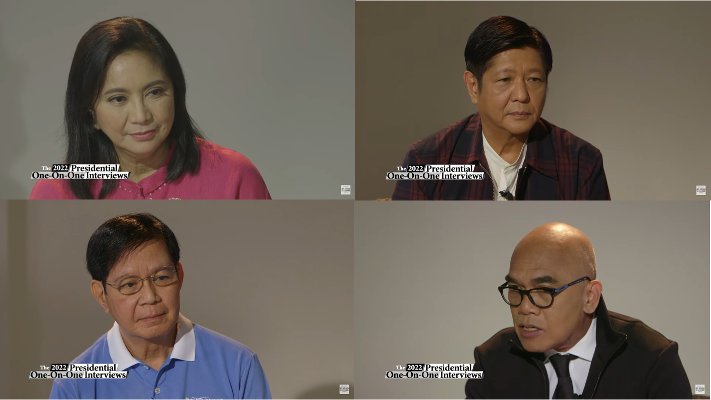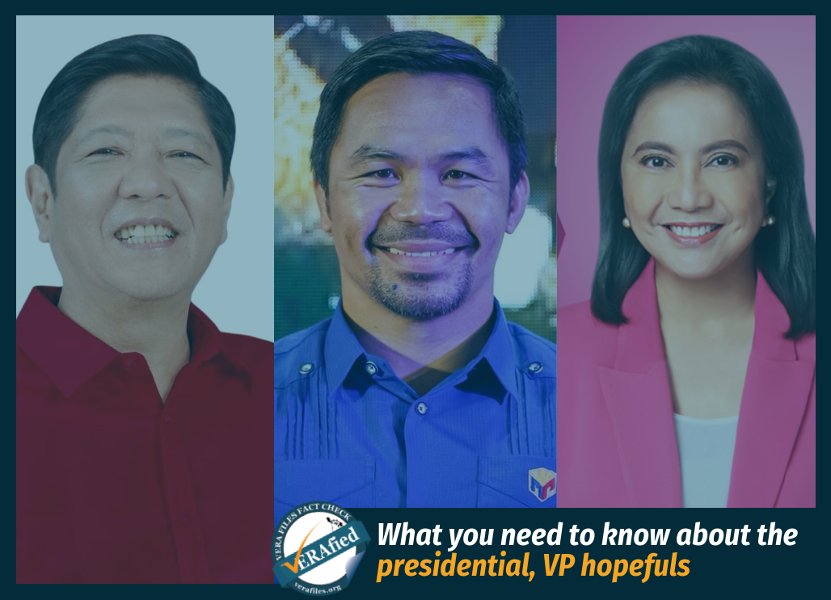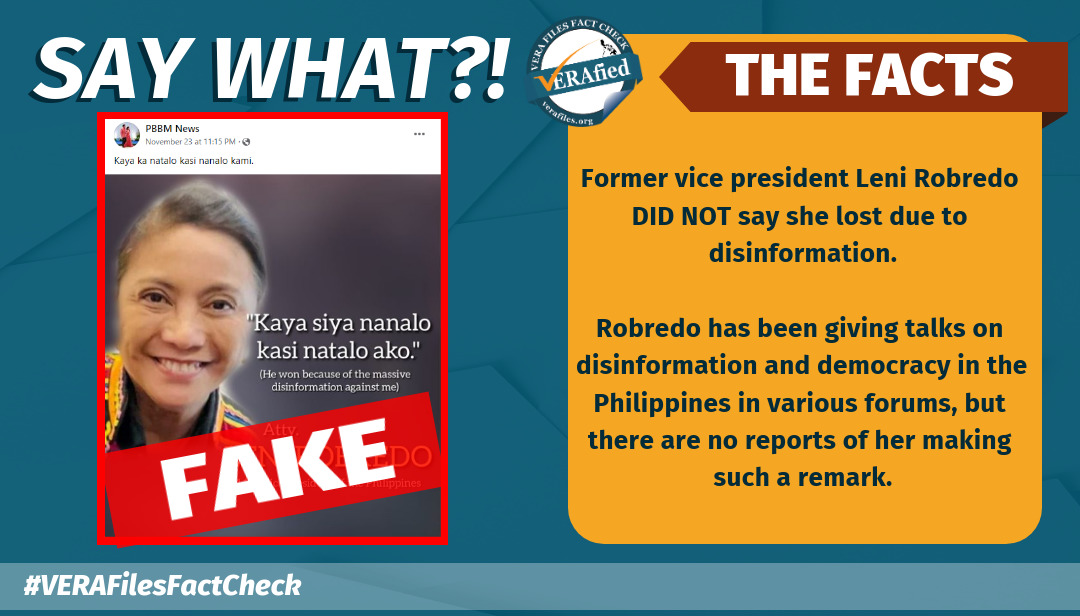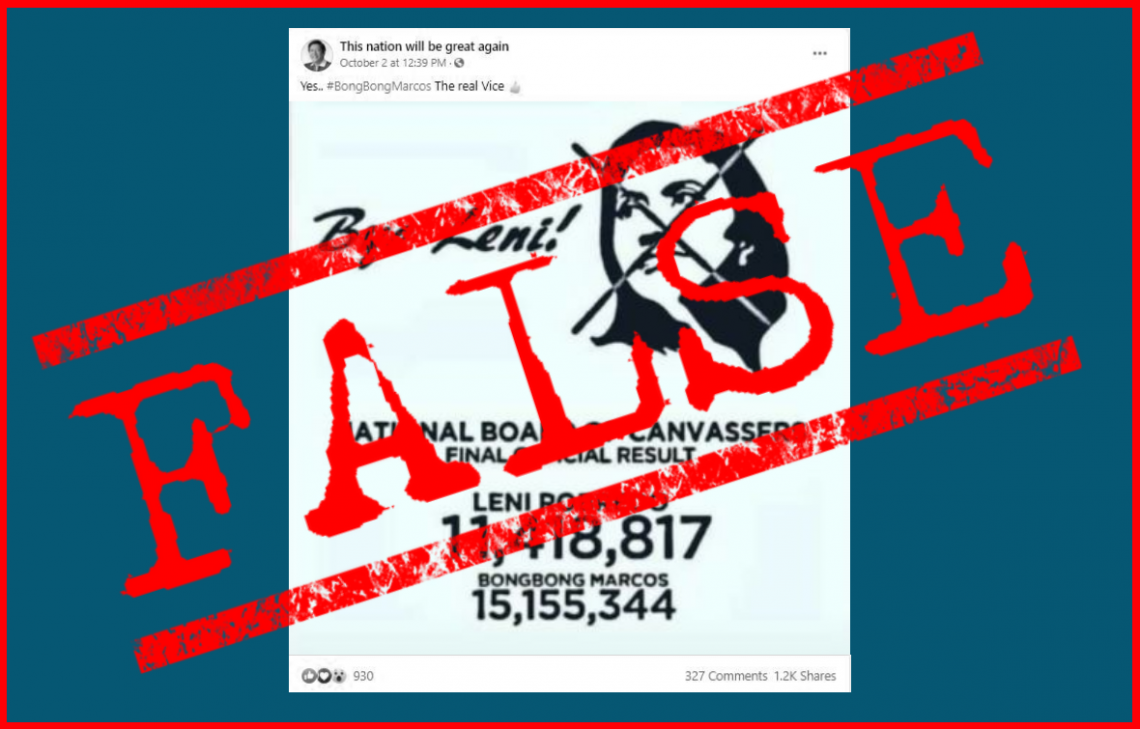
Screengrabs by Bryan Manalang from The 2022 Presidential One-On-One Interviews.
Just a day after Jessica Soho made a big splash in her brand of presidential interviews on Jan. 22 over Channel 7, Boy Abunda followed with his own concept of presidential encounters on Jan. 24 onwards on his YouTube channel.
Abunda’s inaugural subject was Sen. Panfilo Lacson on Monday, followed by Ferdinand Marcos, Jr. on Tuesday, and Vice President Leni Robredo on Wednesday.
Before the airing, Abunda gave his audience a background on how he came to conceptualize the presidential interviews.
The idea hit him middle of 2021, and acknowledged his sponsors that included his congresswoman-sister and some business personalities.
He formed his own research team, found a studio in which to record the series, and true enough, he found a way to stage a TV comeback on his own YouTube channel.
His last public affairs outing was Bottomline, and earlier, Tonight with Boy Abunda, one episode of which was his interview with pianist Cecile Licad in 2002.
Meanwhile, Soho made significant inroads as a broadcast journalist in several talk shows and documentaries which won awards here and abroad.
With a nine-year gap between them (Soho, born in 1964; and Abunda, born in 1955), a comparison is in order.
With his entertainment origins, it can’t be helped that Abunda sizzled in his own network firmament while Soho acquired her own respectable following without the added sparkle of showbiz.
A showbiz talk-show host venturing into public affairs has its pitfalls.
He can demean his subject, or he can add substance.
What did we see of Boy Abunda after the much heralded and widely praised Jessica Soho interviews?
Abunda started with a fairly good showing, face-to-face with Sen. Lacson who didn’t disappoint.
Moreover, it was obvious the host was glued to his written questions and looking like he’d be lost without them.
Thus, the loss of spontaneity in the exchange.
Abunda’s research notes looked voluminous and relished his moments of erudition reciting them.
This is true of his interviews with Lacson and Ferdinand Marcos Jr.
He was forthright with Lacson and very patronizing and a bit intimate with Marcos.
With VP Leni Robredo, netizens remember the number of times she was cut off and rudely interrupted.
But, as they say, TV is a cruel medium.
If host and subject are honest and sincere, it will show.
If they are just grandstanding, it will be magnified a thousand times.
True, an interview can bring out the best and the worst of the subjects and the interviewer.
In the case of Lacson, Marcos and Robredo, the contrasts were glaring.
Lacson was always to the point. At no fault of his, he ended up utterly predictable. He was too prepared for his own sake and didn’t make any effort to sound casual and relaxed.
Through less than half an hour with Marcos, you realize the subject (to quote from a character from My Fair Lady) is condemned by every syllable he utters.
Not even his Oxford accent could save him from the shallowness of his sources and the lack of total grasp on his subjects. He is one captain of the ship you would be very nervous to hitch a ride with.
After Lacson and Marcos, election watchers were curious how Abunda would fare with Robredo and vice-versa.
You noticed that the host practically crafted the same questions he tossed on his first two subjects.
As the interview moved on, you see both subject and host playing games that looked like Who-Will-Survive-Who.
The time slots were strictly enforced, the subject was cut off a number of times on crucial subjects, and unjustly interrupted.
And the netizens had reasons to gang up on the host: Abunda relished his long introductions, leaving very little time for the subject to elucidate on her topic.
It was like watching the host dancing his own version of Strauss’ Dance of the Seven Veils at the expense of his subject and his TV audiences.
But to everyone’s relief, Robredo survived the interruptions and turned around the interview on her favor.
She was cool and brightly persuasive answering question on how she intends to pay the nation’s gargantuan debt.
Realistic and honest she was. “I cannot solve the problems in a few months, but I assure you, after six years, the country would be much better off.”
Her candor reached dramatic points when asked about her fellow presidential contenders and singling out a former presidential son as a “liar.”
Since she rarely reacts to personal criticisms thrown her way, her reaction had the impact of a time bomb exploding when TV audiences didn’t expect it.
In the first three interviews of Abunda with leading presidential contenders, Robredo emerged the runaway winner.
Moreover, the host did not go unscathed.
Netizens gave him a free lecture on how not to conduct an interview.
Posted a netizen: “Some showbiz interviewers need to be schooled in the art of interviewing. His highlighting his ‘extensive research on the subject’ was unnecessary. It goes with the job, really. The best interviewers’ dictum? Less of themselves, more of the interviewee.”
He also bungled his COVID-19 research notes, saying 50 million had died in the Philippines and another 5 million died worldwide.
Deaths in the Philippines totaled 53, 598, not 50 million, as of Jan. 25, according to the Department of Health data. Worldwide, the death toll had breached 5 million people.
But as showbiz insiders would say, bad publicity is good publicity any way you look at it.
You may not please the critics but the feedback keeps the commercials coming.
The TV host doesn’t claim to be a broadcast journalist, but for one who got famous in the medium, he is also an astute businessman.
On the other hand, the Abunda interviews practically defined the winning contenders and eliminated those who fared badly.
Whether you approve or disapprove of Abunda’s hosting style, it is also true the interviews helped voters get to their final choices.
Robredo’s take on various national concerns
“I will honor the commitments. Government should make an effort to regain people’s trust to propel the country’s economic growth.” |
“I will study the local situation and follow the successful examples of other countries. I will be on top of everything. Government is doing something but so many efforts on many fronts are going to waste because of the lack of a good conductor.” |
“This is not just an issue of sovereignty but more importantly of livelihood. I am for nurturing our important relationship with China but it should be based on mutual respect.” |
“When you talk about the environment, it is important that you empower those who will be affected, that you give stakeholders mechanisms so that their voices will be heard. Many laws need to be passed, like the Land Use Bill. This will declare which are the no-mining zones. Second, those areas designated as mineral sites according to the Land Use Act, we have to make sure that it’s the locality that benefits — especially the indigenous peoples — not the businessmen or foreigners.” |
The views in this column are those of the author and do not necessarily reflect the views of VERA Files.



